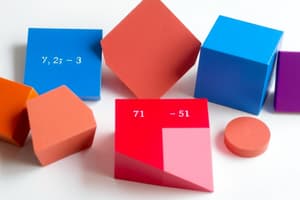Podcast
Questions and Answers
What does the Distributive Laws state for all sets A, B, and C?
What does the Distributive Laws state for all sets A, B, and C?
- A inter (B U C) = (A inter B) U (A inter C) (correct)
- A inter C = A U B
- A U B = A inter C
- A U (B inter C) = (A U B) inter (A U C) (correct)
What is the Identity Law for sets A?
What is the Identity Law for sets A?
- A inter 0 = 0
- A U A = A
- A U 0 = A (correct)
- A inter UNIVERSAL = A (correct)
What does the Complement Laws state?
What does the Complement Laws state?
- A inter A^c = 0 (correct)
- A U A^c = Univ (correct)
- A U A = A
- A inter 0 = 0
What is the Double Complement Law for all sets A?
What is the Double Complement Law for all sets A?
Which of the following are true according to Idempotent Laws for all sets A?
Which of the following are true according to Idempotent Laws for all sets A?
What do Universal Bound Laws state for all sets A?
What do Universal Bound Laws state for all sets A?
What is stated by De Morgan's Laws for sets A and B?
What is stated by De Morgan's Laws for sets A and B?
What do the Absorption Laws state for all sets A and B?
What do the Absorption Laws state for all sets A and B?
What does the Set Difference Law state for sets A and B?
What does the Set Difference Law state for sets A and B?
Flashcards are hidden until you start studying
Study Notes
Distributive Laws
- For sets A, B, and C, the laws govern the distribution of union and intersection.
- First Law: A U (B ∩ C) = (A U B) ∩ (A U C)
- Second Law: A ∩ (B U C) = (A ∩ B) U (A ∩ C)
Identity Laws
- Identity laws clarify the effect of specific set operations.
- First Law: A U Ø = A, where Ø represents the empty set.
- Second Law: A ∩ UNIVERSAL = A, where UNIVERSAL refers to the universal set.
Complement Laws
- Define the relationships between a set and its complement.
- First Law: A U A^c = UNIVERSAL, where A^c is the complement of A.
- Second Law: A ∩ A^c = Ø, indicating that a set and its complement have no elements in common.
Double Complement Law
- States that taking the complement twice returns the original set.
- (A^c)^c = A
Idempotent Laws
- Describes the results of union and intersection operations performed multiple times on the same set.
- First Law: A U A = A
- Second Law: A ∩ A = A
Universal Bound Laws
- Address the interaction of any set with the universal set and the empty set.
- First Law: A U UNIVERSAL = UNIVERSAL; the union with the universal set results in the universal set.
- Second Law: A ∩ Ø = Ø; the intersection with the empty set yields an empty set.
De Morgan's Laws
- Provides crucial insights into the relationship between set operations and their complements.
- First Law: (A U B)^c = A^c ∩ B^c, representing the complement of a union.
- Second Law: (A ∩ B)^c = A^c U B^c, representing the complement of an intersection.
Absorption Laws
- Demonstrate how certain set operations can absorb other operations.
- First Law: A U (A ∩ B) = A, indicating that the union duplicates the original set.
- Second Law: A ∩ (A U B) = A, where the intersection with the union equally returns the original set.
Set Difference Law
- Defines the meaning of the set difference operation.
- A - B = A ∩ B^c, illustrating that the difference represents elements in A not found in B.
Studying That Suits You
Use AI to generate personalized quizzes and flashcards to suit your learning preferences.




